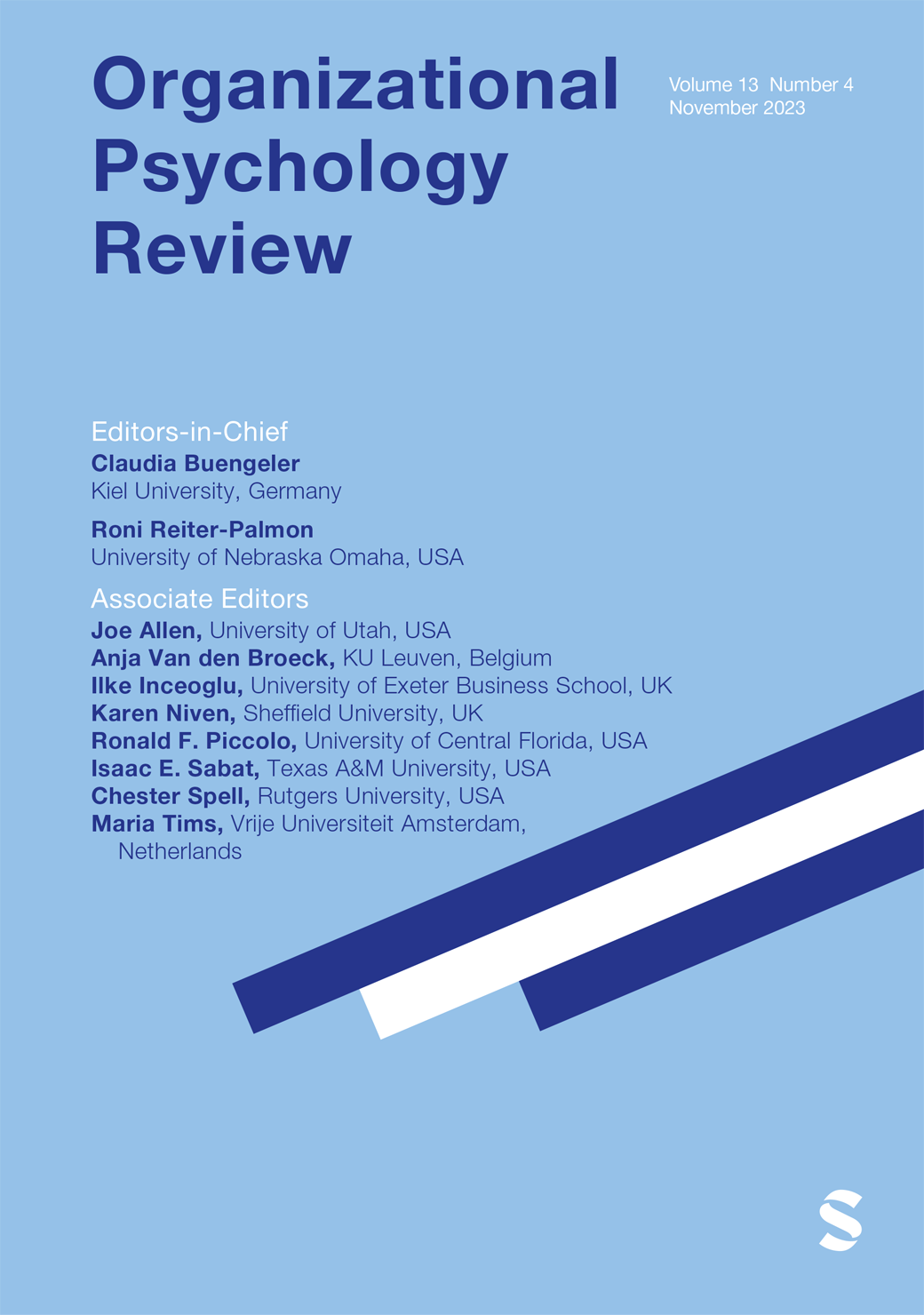工作中的生活意义:认知经验自我理论(CEST)视角
IF 7.1
1区 心理学
Q2 MANAGEMENT
引用次数: 0
摘要
本文运用认知-经验自我理论(CEST)探讨工作中存在意义的产生。首先,我们使用CEST的原则来详细说明来自原型工作环境的线索-实现促进工作环境(RfWE)和合理化促进工作环境(JfWE) -如何被信息处理系统解释为将生活意义(MiL)作为一致性,目的和重要性的内部或外部表现注入生活意义(MiL)。接下来,我们解释了工作中心性和主动意义制造能力的个体差异如何调节了JfWE对MiL的影响,而不是RfWE对MiL的影响。最后,我们创建了一个存在意义状态的法理网络,该网络是由RfWE和JfWE同时存在或不存在而产生的。总之,通过应用CEST的信息处理视角,我们开发了一个综合模型,解释了工作如何驱动MiL,阐明了由此产生的存在状态,并评估了个体差异在意义制造中的作用。本文开发了一个综合模型,概述了工作环境如何通过培养生活意义感(MiL)来预示人类的福祉。基于认知-经验自我理论(CEST),阐述了通过经验系统和理性系统对信息的平行竞争加工,探讨了来自原型工作环境——实现促进工作环境(RfWE)和辩护促进工作环境(JfWE)的线索如何影响生活中不同口味的MiL和无意义感。我们建立的论点是,RfWE激活了经验系统的功能,以诱导内部MiL作为内部一致性,内部目的和内部价值意义的感觉。同时,JfWE触发了理性系统的功能,构建了对外部MiL的判断,即外部连贯性、外部价值目的和外部价值意义。然而,RfWE和JfWE之间的相互作用可能导致复杂的场景,包括有利的状态,如整体意义、积极的存在感和积极的存在叙事。然而,它也会通过存在的疲劳、存在的茧或存在的徒劳而导致个人的生活毫无意义。尽管如此,在工作中心性和创造意义的主动行为方面的个体差异可以作为调节因子,改变工作对JfWE中MiL的影响强度,而在RfWE中则没有。本文章由计算机程序翻译,如有差异,请以英文原文为准。
Meaning in life through work: A cognitive-experiential self-theory (CEST) perspective
This article explores existential meaning-making from work using the cognitive-experiential self-theory (CEST). To start with, we use the tenets of CEST to elaborate on how the cues from archetype work environments—a realization facilitating work environment (RfWE) and justification facilitating work environment (JfWE)—are interpreted by information-processing systems to imbue meaning in life (MiL) as internal or external manifestations of coherence, purpose, and significance. Next, we explain how individual differences in work centrality and proactive meaning-crafting ability moderate the impact of JfWE, but not of RfWE, on MiL. Finally, we create a nomological network of existential meaning states emerging from the simultaneous presence or absence of RfWE and JfWE. In summary, by applying the information-processing lens of CEST, we develop an integrated model that explains how work drives MiL, elucidates the resultant existential states, and assesses the role of individual differences in meaning-making. Plain Language Summary This article develops an integrated model that outlines how work environments can augur human well-being by fostering a sense of meaning in life (MiL). Based on the cognitive-experiential self-theory (CEST), expounding parallel-competitive processing of information through the working of the experiential and rational system, we explore how the cues from archetype work environments—a realization facilitating work environment (RfWE) and justification facilitating work environment (JfWE)—influence the varied flavors of MiL and meaninglessness in life. We build the argument that RfWE activates the functioning of the experiential system to induce a feeling of internal MiL as internal coherence, internal purpose, and internal value significance. At the same time, JfWE triggers the functioning of the rational system to construct a judgment of external MiL as external coherence, external worthy purpose, and external value significance. However, the interaction between RfWE and JfWE can result in intricate scenarios, including favorable states such as holistic meaning, positive existential feelings, and positive existential narratives. Still, it can also lead individuals into meaninglessness in life through existential fatigue, existential cocoon, or existential futility. Nonetheless, individual differences in work centrality and proactive behavior to craft meaning can act as moderators to alter the intensity of work’s impact on MiL in a JfWE but not in an RfWE.
求助全文
通过发布文献求助,成功后即可免费获取论文全文。
去求助
来源期刊

Organizational Psychology Review
Multiple-
CiteScore
10.00
自引率
1.60%
发文量
25
期刊介绍:
Organizational Psychology Review is a quarterly, peer-reviewed scholarly journal published by SAGE in partnership with the European Association of Work and Organizational Psychology. Organizational Psychology Review’s unique aim is to publish original conceptual work and meta-analyses in the field of organizational psychology (broadly defined to include applied psychology, industrial psychology, occupational psychology, organizational behavior, personnel psychology, and work psychology).Articles accepted for publication in Organizational Psychology Review will have the potential to have a major impact on research and practice in organizational psychology. They will offer analyses worth citing, worth following up on in primary research, and worth considering as a basis for applied managerial practice. As such, these should be contributions that move beyond straight forward reviews of the existing literature by developing new theory and insights. At the same time, however, they should be well-grounded in the state of the art and the empirical knowledge base, providing a good mix of a firm empirical and theoretical basis and exciting new ideas.
 求助内容:
求助内容: 应助结果提醒方式:
应助结果提醒方式:


